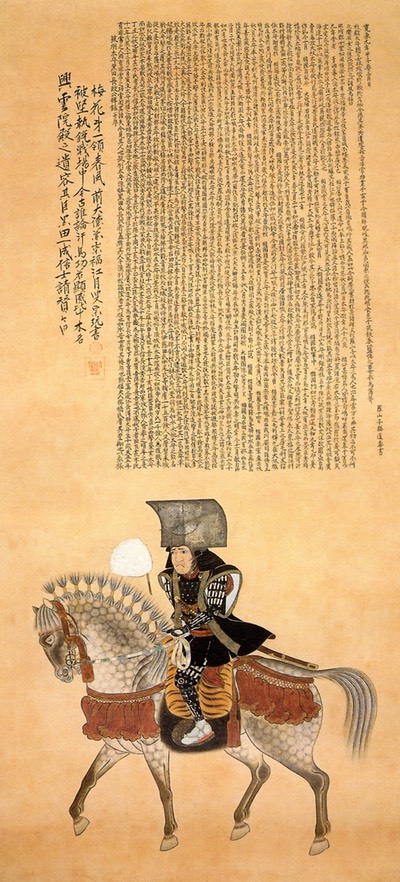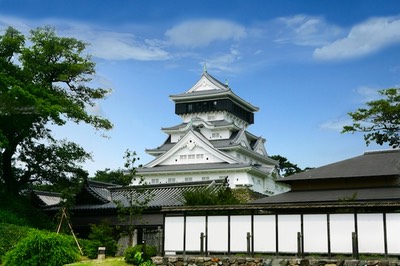Like Musashi’s mother, Ogawa (also Ogō) Gondayū Rōshin’s clan hailed from Harima province. Gondayū’s grandfather had been a senior retainer, or karō (家老) to Kodera Masamoto (1529–84), at that time a powerful warlord, who contended with the Bessho and the Akamatsu for influence in the region. When, in 1580, the Kodera were overrun by Oda Nobunaga, many of their retainers joined rank with the Kuroda, a clan with whom they were closely related. When Gondayū’s uncle fell in the Korean campaign, his father, Kanzaemon, became the head of the Ogawa clan and moved to Kyushu when Kuroda Nagamasa (1568–1623) was promoted to the Fukuoka fiefdom in the province of Chikuzen.
Gondayū was Kanzaemon’s eldest son and entered Lord Nagamasa’s service at a young age. When, in 1623, Nagamasa was succeeded by his eldest son, Tadayuki (1602–54), Gondayū fell out with his new master and forced to leave Fukuoka. He moved to the port of Kitsuki, where he entered the service of Ogasawara Tadatomo (1599–1663). Tadatomo was the brother of Ogasawara Tadazane (see Musashi’s Benefactors). In 1632 he had become the daimyo of Kitsuki when his brother was promoted to the fiefdom of Kokura.
It was probably during his time in Kitsuki that Gondayū came into contact with Musashi. Though the two might have met in Kitsuki, the bout between the two warriors would probably not have taken place there, since Muni probably died sometime during the preceding decade (see Musashi’s Father). It is more likely that Gondayū met Musashi at Kokura, where the latter was staying with his son, Iori, who had by now become one of Tadazane’s senior retainers.
It is no coincidence that we know so much about Gondayū, for Tanji Hōkin, the author of the Bushū denraiki, was he grandson of Gondayū’s sister. Gondayū’s anecdotes, then, would have been passed on by his sister to her children, and her grandchildren. Indeed, Hōkin might well have heard them directly from the mouth of his uncle. Thus Hôkin recounts how:
露心、常々物語に、「我等杯、若かりし時は、命を捨る事、屑ともせず。武州と立合、打太刀を致、「己、一太刀可打」と思儲け、木刀をし取立向ふ。武州、二刀を取、大太刀を杖につき、肩をくはつとくつろげらるヽと、肝にこタへ、蹈掛たる足を一足は必引たり。是、露心に不限、何れとても同然たり。武州が事は、咄したりとも、中々合点行まじ」と語れり。
Rōshin would often say “when I was young I did not give a damn about laying down my life. When I met with Musashi I challenged him to a duel. I thought ‘I will give him a thrashing’ and, seizing my bokutô, I went for him. Musashi simply took his two bokutô and leaning on the long bokutô he relaxed his wide shoulders with a flick of his muscles. At this I grew timid and almost by instinct I drew back the very leg with which I had sought to advance. It was not just with me but the same with everyone. Yet, however much I talk, it is nigh on impossible to make people understand what Musashi was really like.”
Any queries of remarks? Launch or join a discussion at our new FORU

